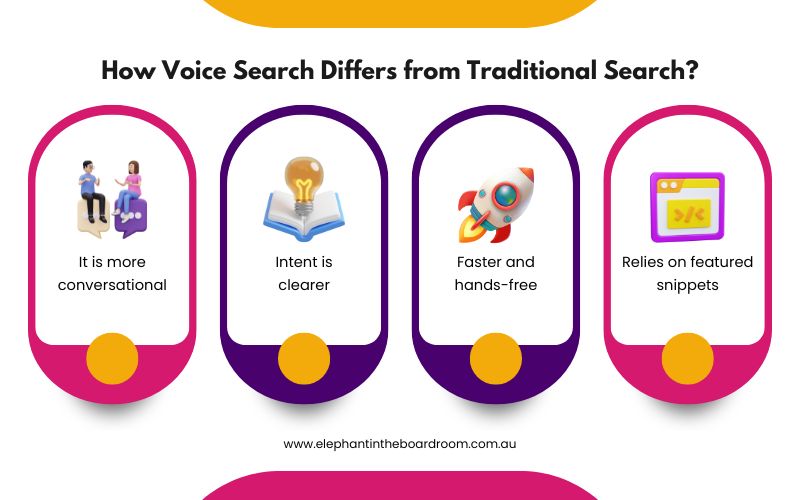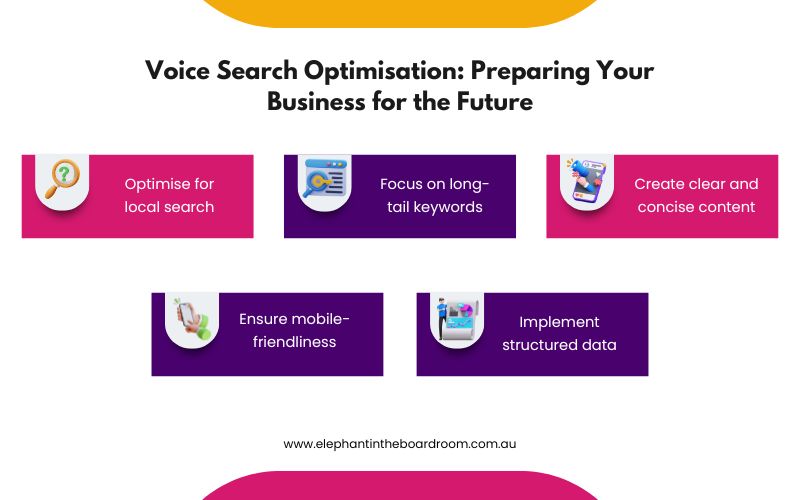
Voice Search Optimisation: Preparing Your Business for the Future
"Hey Google, where is the best local business near me?” Sounds familiar? Well, you are already living in the age of voice search. It is quick, convenient, and changing the game for how people interact with technology and businesses. With smart speakers in homes and voice assistants in every pocket, more people are speaking their searches instead of typing them. That shift is shaping a new kind of online visibility, and voice search optimisation is becoming essential if you want your business to stay discoverable.
This blog is your wake-up call. We are diving into how voice search optimisation is reshaping the way customers discover brands, and more importantly, how your business can be ready for it. Keep reading, because the way people search is changing fast… and you don’t want to be left behind.
What’s Inside:
- The Rise of Voice Search: Trends and Statistics
- How Voice Search Differs from Traditional Search?
- Voice Search Optimisation: Preparing Your Business for the Future
- Future-Proof Your Brand with Voice Search Optimisation
The Rise of Voice Search: Trends and Statistics
Voice search is a technology that allows users to perform searches on the internet by speaking into a device, such as a smartphone or smart speaker, rather than typing. This hands-free method leverages voice recognition software to interpret spoken commands and queries, providing quick and convenient access to information.
In Australia, the adoption of voice search is on the rise. Recent statistics indicate that nearly 40% of Australian households own a smart speaker, with Google Home leading at 31%, followed by Amazon Echo at 21% and Apple HomePod at 19%.
Furthermore, 90% of users find voice search faster and more convenient than traditional typing. This growing preference for voice-activated technology underscores the importance for businesses to optimise their digital presence for voice search.
How Voice Search Differs from Traditional Search?

We have all done it, called out to Siri, Alexa or Google Assistant while making dinner, driving, or just being too lazy to type. Voice search is now part of our everyday lives, but it works quite differently from the good old-fashioned way of typing into a search bar.
Here’s how voice search stacks up against traditional search:
It is More Conversational
When we type, we tend to use short, snappy keywords like “weather Melbourne” or “best coffee near me.” But when we speak, it sounds more like, “Hey Google, what’s the weather like in Melbourne today?” Voice searches are more natural and often phrased as full questions.
Intent is Clearer
Because voice searches are usually longer and more detailed, they give search engines a better sense of intent. This helps Google serve more specific results. For businesses, it means optimising for long-tail keywords and answering common customer questions can give you a big edge.
Faster and Hands-free
The biggest driver of voice search? Convenience. People use it when they are multitasking, walking, driving, cooking, or even brushing their teeth. That means search results need to be quick, clear, and easy to digest, ideally read aloud in a few seconds.
Relies on Featured Snippets
Voice search relies heavily on featured snippets and properly marked-up data. If your site is well-optimised and structured, your chances of being the spoken answer go way up.
Voice Search Optimisation: Preparing Your Business for the Future

If your website isn’t geared for voice search, it’s time to catch up. Here’s what you need to know to make your business easier to find by voice.
Optimise for Local Search
Many voice searches are local in nature, like "Find a plumber near me." Ensure your business is listed accurately on platforms like Google Business Profile, and include local keywords in your website content to enhance your local SEO.
Focus on Long-Tail Keywords
Specific phrases that users are more likely to speak are essential for voice search optimisation. These keywords often reflect the natural questions people ask, such as "How do I fix a leaky tap?" Integrating these into your content can improve your visibility in voice search results.
Create Clear and Concise Content
Voice assistants aim to provide quick answers. Structure your content to answer common questions directly and succinctly. Using FAQ sections can be particularly effective in addressing specific queries.
Ensure Mobile-Friendliness
Given that many voice searches occur on mobile devices, having a mobile-optimised website is important. A responsive design that loads quickly can enhance user experience and improve your search rankings.
Implement Structured Data
Using schema markup helps search engines understand your website content better, increasing the chances of being featured in voice search results. This structured data can highlight important information like business hours, reviews, and services offered.
Future-Proof Your Brand with Voice Search Optimisation
Voice search optimisation isn’t something to leave for later, it is happening now. If your business isn’t already preparing for this shift, you are at risk of falling behind. Elephant in the Boardroom makes voice search optimisation feel simple, strategic, and tailored to your audience, so you are ready for the way people search today and tomorrow.
Want to stay competitive and relevant in a fast-changing digital space? Let’s chat. Our team can help you kickstart a voice search optimisation strategy that sets your business apart and puts you in front of the right people, at the right time, just by asking.



